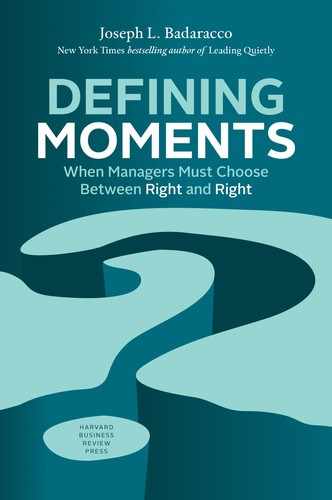6D
EFINING
M
OMENTS
thing.’’ These speeches serve a useful purpose. They are usually
sincere, some are genuinely inspiring, and they may even keep some
employees on the straight and narrow.
But the inspirational approach offers little help with serious con-
flicts of responsibility. The truly difficult question is the one that
Barnard and Sartre raise: What to do when one clear right thing
must be left undone in order to do another or when doing the right
thing requires doing something wrong? For managers, these problems
are especially complex. Their right-versus-right problems typically
involve choices between two or more courses of action, each of
which is a complicated bundle of ethical responsibilities, personal
commitments, moral hazards, and practical pressures and constraints.
Inspirational ethics usually avoids problems like these. It also
ignores Barnard’s warning and the problem of dirty hands. Uplifting
platitudes ring hollow for these issues. They lead to deep and turbu-
lent ethical waters. The question of right versus right sometimes
reminds managers of difficult experiences of their own, which they
would rather not recall because they involve feelings of failure, guilt,
or loss. The question Do you think you can govern innocently? is
unsettling, emotionally and intellectually. Our natural reaction is to
respond yes, but this contradicts our experience.
Yet, to make progress on these issues, one must begin by looking
them in the face. This is not a simple matter. The first step is to
examine the basic kinds of right-versus-right problems that managers
must solve. The next chapter does this through detailed accounts
of problems facing three different managers.
The second step is to understand, in depth, why right-versus-
right conflicts are so difficult. Much of the time, we think about
problems in terms of unexamined categories, the familiar little boxes
that we use to sort problems—as legal issues, business ethics issues,
management issues, and so on. And, once we put a problem in the
right box, we think we have the tools for solving it. But right-versus-
right choices can’t be forced into familiar categories, and they evade
standard solutions. Neither Barnard nor Sartre would have dwelt on
the problem of conflicting responsibilities if the answer were a simple
matter of finding the right category and applying the right concepts.
This book argues that right-versus-right choices are best under-
stood as defining moments. These are decisions with three basic charac-
Dirty Hands 7
teristics: they reveal, they test, and they shape. In other words, a
right-versus-right decision can reveal a manager’s basic values and,
in some cases, those of an organization. At the same time, the
decision tests the strength of the commitments that a person or an
organization has made. Finally, the decision casts a shadow forward.
It shapes the character of the person and, in some cases, the organiza-
tion.
T
HE
U
RGENT
Q
UESTIONS
For managers, the urgent questions are: How do I think about defin-
ing moments? How do I resolve them in ways I can live with?
This book offers practical advice for reflecting on right-versus-right
conflicts and finding ways to resolve them. In exploring three such
conflicts in depth, it provides a framework for thinking through
these difficult decisions.
The framework consists of a series of phrases and questions, each
with deep roots in classic and contemporary moral philosophy.
The questions encourage reflection, evoke personal perspectives and
experiences, and invite self-assessment. They challenge managers to
reflect on their relationships with people at work, at home, and in
their communities. Each of these phrases and questions is based on
a powerful idea about life and work, but readers must meet them
halfway in order to understand and apply them. In other words, this
approach to difficult choices does not stand at a lectern and tell
people what to do. Instead, each question or phrase taps people on
the shoulder, surprises them a bit, and then suggests a way of re-
flecting on some important aspect of their lives and their work.
The ‘‘dirty hands’’ passage offers a glimpse of this approach to
ethical problems. ‘‘Dirty hands’’ is not simply a colorful phrase. Nor
is it intended as a snapshot summary of Sartre’s philosophy. And,
although it can be the focus of rigorous philosophical analysis, that
is not its role here.
3
‘‘Dirty hands’’ often reminds people of difficult episodes in their
lives. So, too, does the question Do you think you can govern
innocently? The phrase and the question can evoke memories, im-
ages, experiences, and feelings. They may also awaken abiding feel-
8D
EFINING
M
OMENTS
ings of remorse about ethical failures or give people a sense of hard-
won pride as they recall moral struggles they have handled well.
This personal perspective is doubly valuable. It encourages people—
whether managers or not—to reflect on their own lives and experi-
ences. At the same time, it gives them an empathic view, a view
from the inside, of what is at stake when managers and others must
resolve serious conflicts among their responsibilities.
..................Content has been hidden....................
You can't read the all page of ebook, please click here login for view all page.
